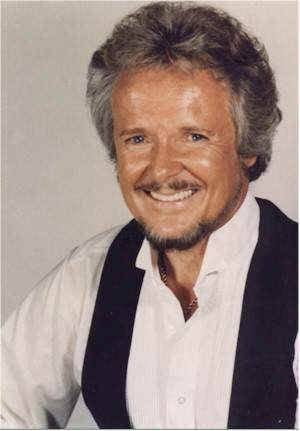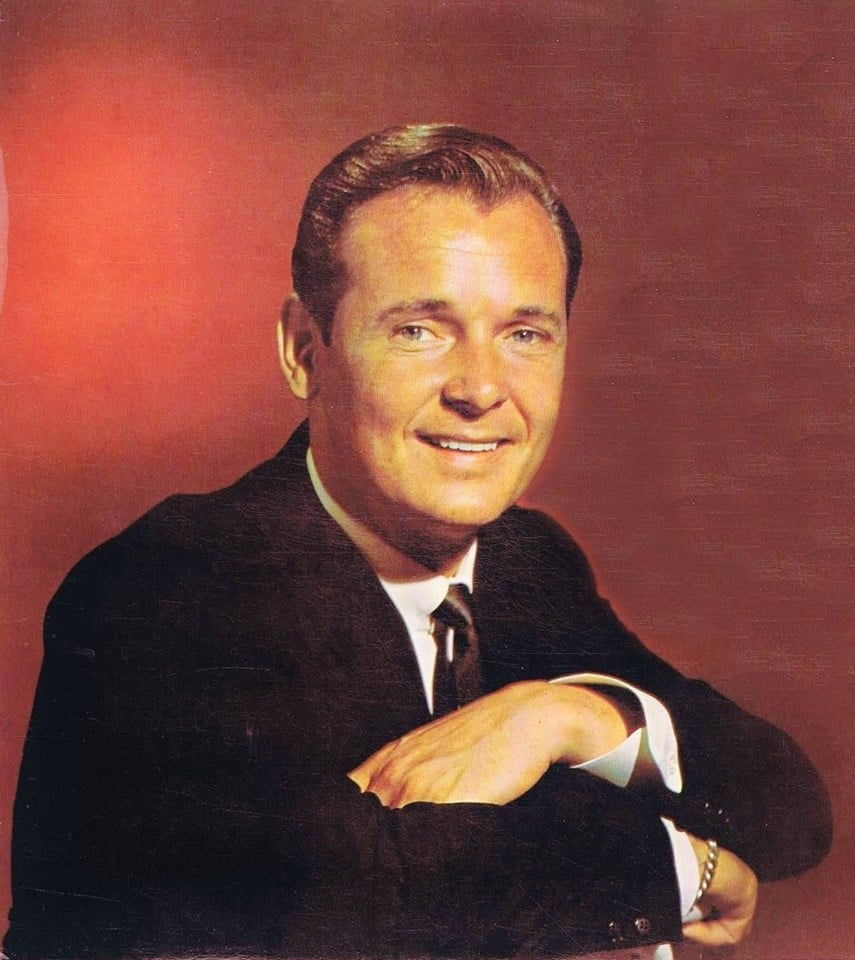January 4, 1998 – John Gary died at Baylor University Medical Center
Gary became a popular stage and television star during the 1960s because of his soulful, heartfelt singing style and three-octave range. His signature song, “Danny Boy,” revealed his love for Irish tunes, but his singing repertoire included show tunes, country hits, and romantic ballads.
He was born to Harold Strader and Merle Dawson Harrington, who already had two children, Richard and Shirley, and later had another son, Malcolm. Siblings Shirley and John (at age 5!) performed together in numerous talent shows. At age nine he won a three-year scholarship as a boy soprano to the Cathedral School of St. John the Divine in New York. At age ten he won two “Pins of Distinction” from the American Theater Wing and the Merchant Seaman’s Club for the Stage Door Canteen. He made 45 recordings by age 11, and at age 12 he toured the southern states with Frank Pursley, a blind pianist for the Mason Conservatory.
By Gary’s twelfth birthday his parents had divorced, and his mother Merle married photographer and actor Bob Yale, who brought his new wife and her children out to Hollywood. After he toured the Southern states with Macon Conservatory pianist Frank Pursley he went to live with his mother and three siblings in California. Young John worked at numerous part-time jobs, while gaining some recognition for his well-regarded boy soprano. Hedda Hopper had a role in getting him his first professional work, and John entertained on radio shows. He attended North Hollywood Junior and Senior High and enrolled in Hollywood Professional School while performing as a regular staff member on CBS/KNX radio. He also sang for tips as he worked as a waiter, doorman, and usher at various restaurants, hotels, and theaters.

His stepfather, Bob Yale, became Gary’s agent and manager and promoted his early career in Hollywood. As a teenager, Gary made stage and radio appearances with Lionel Barrymore, Paul Whiteman’s Orchestra, Billy Wardell, Martha Tilton, Marie Wilson, Jack Cooper, George Jessel, Ken Murray’s Blackouts, and others.
When he was seventeen his voice finally began to crack and change, and he decided his singing career was over. He joined the US Marine Corps, in which he served as a military policeman and chaplain’s assistant. But he began singing in military chapel services and found his voice had matured to a brilliant tenor with rich baritone flexibility. After being discharged from the service at age twenty Gary met Bob McGimsey, who became his mentor and manager.
Gary made “demo” recordings for songwriters such as Harry Ruby, Sammy Fain, Jimmy McHugh, Hoagy Carmichael, Johnny Mercer, Victor Young, and Henry Mancini. He performed regularly on Don McNeill’s popular network radio show, “Breakfast Club,” and then began a steady career making television and stage appearances across America.
John’s performance career began to gain more exposure, ironically, by working to reconcile with his biological father Harold. After his father was traced, John moved to Binghamton, New York to be near him, and soon developed a popular radio show and also performed on some early TV shows.
He then decided to return to California, but stopped first in New Orleans, where he had a radio show, learned to scuba-dive, which led to the underwater competition, earned a skipper’s license, and his formation of a company that provided underwater closed-circuit television to oil rigs.
New Orleans also brought John his first wife, Muriel Stafford Getz, who already had 2 sons, whom he adopted. She bore him his first child, John Gary Strader Jr. The young father signed a recording contract with a local company, and began his real adult recording career.
Afterward, he went to Chicago, where he was signed to be the male vocalist on a prominent morning radio show. He also traveled back to NYC in 1962, where he had a 15-minute program on WDSU-TV, and where a seemingly impromptu invitation to sing at a party at Charlton Heston’s apartment (a teenaged Liza Minelli also sang for the guests), accompanied just by his own guitar, led to his greatest recording contract.
Impressing a lawyer guest who knew an RCA executive, the 30-year-old John Gary recorded a few sample songs, and was signed to a major contract with the company that once only used his demo tracts a few years earlier. In all, he made 23 records for RCA, and recorded for other (and smaller) companies later in life. He won a Grammy for Most Promising Male Vocalist in 1963. His performance style from the beginning was one of establishing a sense of intimacy with his audience, made easier by his comfortably handsome looks.
During Gary’s affiliation with RCA he recorded more than twenty albums; the first was “Catch a Rising Star.” He also recorded about twenty-five albums for various independent labels. He performed on “The Tonight Show,” “The Ed Sullivan Show,” “The Carol Burnett Show,” “The Mike Douglas Show,” “The Bell Telephone Hour,” “Dick Clark’s American Bandstand,” and “The Danny Kaye Show.” In the early 1970s a summer-replacement program for Danny Kaye’s CBS television show evolved into Gary’s own syndicated a 90-minute syndicated television variety show, “The John Gary Show,” which ran for three years. Gary also sang in stage productions (including “The Student Prince” and “Camelot”) at venues such as the Kansas City Starlight Theater, the Dallas Theater in the Round, and the Dallas Crystal Palace. Gary’s popularity continued well into the 1990s, and he sang with numerous symphonies and at various concert halls, conventions, and special events around the world.

In 1971 he moved to Richardson, Texas, and married Lee Wilson. Gary also had children from previous relationships with Muriel Stafford Getz and Lois Reidy McDonnell. His family included four sons, two adopted sons, and seven stepchildren. Although Gary’s singing talents made him famous, he excelled at many other interests throughout his life, such as boxing, archery, and underwater diving. Among his achievements are two published books of poetry and numerous published songs, including “Possum Song,” “I’ll Say It All Again,” “One Red Rose,” and “I’ll Never Fall in Love Again.”
He received many honors and awards, including the National Association of Recording Arts and Sciences “Most Promising Vocalist” Grammy in 1963, mention in the California and United States congressional records, and numerous appearances as grand marshal at St. Patrick’s Day parades throughout America. Though he scored no hit singles, some of his mid-1960s albums rose to the Top 20, including “The Nearness of You” (which reached #11 in 1965), “Encore,” and “A Little Bit of Heaven.” Other popular albums by Gary include “Songs of Love and “Romance,” “Ireland’s Greatest Hits,” “The Very Best of John Gary,” and “The Essential John Gary.”
Dick Alba, Mr. Gary’s longtime diving partner, said Mr. Gary was an all-around athlete and set a record for underwater endurance, often staying under for 24 hours at a time. A gifted athlete, John set world records for underwater endurance. At a New Orleans athletic club, he set a record of 41 hours for underwater endurance, beating a professional diver and a career athlete. Later, under supervision of the US Air Force, he expanded upon this feat, staying under water for 78 hours, 45 minutes. He also participated in the weightlessness studies for the astronaut program. He received 2 patents for diving devices he had invented. In the late 1950s, Mr. Gary invented the Aqua-peller, an underwater propulsion device. He and Alba tested the equipment in Clearwater, Florida. He also tried out for a place on the 1984 Olympics archery team and scored 1100 of a possible 1400 points.
In 1991 Gary was diagnosed with cancer, but performed at the 1991 and 1992 Archdiocesan Charity Balls in New Orleans. His son, Jason W. Gary, said his father always considered New Orleans a second home and liked to stop in at the Pearl Oyster Bar just off Canal Street. He performed regularly at the Fairmont’s Blue Room and the New Orleans Summer Pops for many years after leaving the city and long had one of the city’s most active fan clubs.
In 1992, he learned he needed a bone-marrow transplant to treat an inoperable form of cancer. Because he lacked the money for the procedure, the local Foundation for Artists, Musicians and Entertainers held a two-night fund-raiser for him. At the time of his death, he’d recently completed a tour with the Mantovani Orchestra and was preparing to release a new CD.
SOURCES
http://www.johngary.com/
http://www.imdb.com/name/nm0308879/bio
http://www.mtv.com/artists/john-gary-1/biography/
https://variety.com/…/vocalist-john-gary-dead-at-65…
https://tshaonline.org/handbook/online/articles/fgaah
https://en.wikipedia.org/wiki/John_Gary